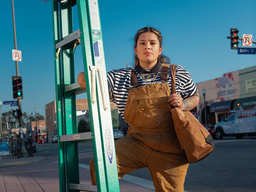Johanna Toruño — UNAPOLOGETIC: Street Art as Activism and Liberation
Explore street art as a tool of resistance
Location
Library and Gallery, Albin O. Kuhn
Date & Time
September 23, 2025, 4:00 pm – 6:00 pm
Description
Johanna Toruño
UNAPOLOGETIC: Street Art as Activism and Liberation
Part of the Fall 2025 Humanities Forum
The Humanities Forum presents Johanna Toruño, a Salvadoran-born, community-taught visual artist who uses the streets as a public platform and gallery. Raised in San Salvador until being displaced in the U.S. at 10, she is inspired by her experiences growing up in the aftermath of the civil war to use poster work as a medium to self-express and center a queer migrant lens. As she explains, “political art is the people’s art as it has been used for many generations.” In this talk, Unapologetic: Street Art as Activism and Liberation, Toruño will discuss how she utilizes street art as a tool of resistance.
Johanna Toruño is the founder of The Unapologetic Street Series, a street art series that is exhibited at public spaces, such as walls, utility posts, and mailboxes. Her bold imagery and statements, often adorned in lush florals, celebrate queer, working class, and immigrant communities. Through her work, Toruño challenges social norms and centers messages of self-reflection and self-acceptance. Using a soft aesthetic with colors that remind her of home, Toruño brings storytelling and a chance for her audience to re-learn and decolonize their own self to accessible spaces. Her political and social messages highlight topics of reimagining norms, and the joy of holding space for collective liberation. Johanna is a TED speaker and lecturer at Universities like Stanford, Princeton, Columbia, and others. Johanna’s work has been featured in The New York Times, Teen Vogue, NPR, Nylon, and more. Johanna lives and works in Los Angeles with her partner and 2 dogs. If she’s not wheat pasting, she’s cooking.
Admission is free, and a reception will follow.
This talk is co-sponsored by the Dresher Center for Humanities; the Center for Innovation, Research, and Creativity in the Arts; the Center for Social Justice Dialogue; the Department of Gender, Women’s, + Sexuality Studies; the Latin American Feminisms Faculty Working Group; the Latin American Studies Minor; the Latinx and Hispanic Faculty Association; The Mosaic: Center for Cultural Diversity; and the Orser Center for Public Humanities.

This event is supported in part by the Arts+ initiative.
